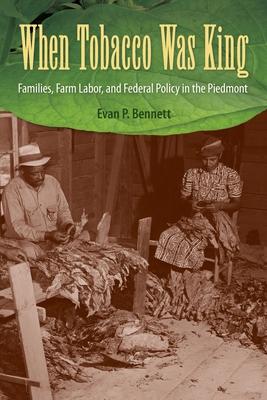Tobacco has left an indelible mark on the American South, shaping the land and culture throughout the twentieth century. In the last few decades, advances in technology and shifts in labor and farming policy have altered the way of life for tobacco farmers: family farms have largely been replaced by large-scale operations dependent on hired labor, much of it from other shores. However, the mechanical harvester and the H-2A guestworker did not put an end to tobacco culture but rather sent it in new directions and accelerated the change that has always been part of the farmer’s life.
In WhenTobaccoWasKing, Evan Bennett examines the agriculture of the South’s original staple crop in the Old Bright Belt--a diverse region named after the unique bright, or flue-cured, tobacco variety it spawned. He traces the region’s history from Emancipation to the abandonment of federal crop controls in 2004 and highlights the transformations endured by blacks and whites, landowners and tenants, to show how tobacco farmers continued to find meaning and community in their work despite these drastic changes.| FindBook |
|
有 1 項符合
when tobacco was king: families, farm labor, and federal policy in the piedmont的圖書 |
 |
$ 1024 | When Tobacco Was King: Families, Farm Labor, and Federal Policy in the Piedmont
作者:Bennett 出版社:University Press of Florida 出版日期:2024-05-14 語言:英文 規格:平裝 / 162頁 / 22.86 x 15.24 x 0.97 cm / 普通級/ 初版  看圖書介紹 看圖書介紹
|
|
|
圖書介紹 - 資料來源:博客來 評分:
圖書名稱:When Tobacco Was King: Families, Farm Labor, and Federal Policy in the Piedmont
|











